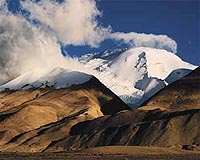| . |  |
. |
Paris (AFP) Sept 16, 2009 The Greenland icesheet responded to global warming over the past 10,000 years more quickly than thought, according to a study released Wednesday. As a result, a medium-sized temperature increase this century could cause the continent-sized ice block to start melting at an alarming rate, it suggests. "It is entirely possible that a future temperature increase of a few degrees Celsius in Greenland will result in a icesheet mass loss and contribution to sea level rise larger than previously projected," it warns. Greenland contains enough water to raise sea levels by about seven metres (23 feet). Even a far more modest increase would put major coastal cities under water and force hundreds of millions of people out of their homes. Until recently, experts were confident that the planet's two icesheets -- in Greenland and Antarctica -- would remain largely stable over the coming centuries despite global warming. But more recent studies have cast doubt on this, showing the pace at which glaciers are sliding off from both icesheets into the oceans has picked up over recent decades. The new paper, published in the British journal Nature, uses a new technique for measuring changes in the icesheet over the last 10,000 years that resolves a paradox. Earlier measurements suggested that parts of Greenland had somehow defied a trend of general warming in the northern hemisphere during a 3,000 year period that started some 9,000 years ago. The new research, led by Bo Vinther of the University of Copenhagen in Denmark, demonstrates that the problem lay with how the the raw data had been interpreted. The team examined core samples taken from four locations from the icesheet, which reaches depths of more than three kilometers (two miles). As with earlier studies, the results were inconsistent. But with the help of two new samples taken from two areas just beyond the icesheet, the researchers were able to determine that the variations were due to changes in height, not because of inconsistent warming. "The elevation itself causes different temperatures," Vinther said in a press release. As a consequence, the icesheet responded more uniformly -- and more vigorously -- to rising temperatures during this period. Share This Article With Planet Earth
Related Links Beyond the Ice Age
 Himalayas endangered by climate change
Himalayas endangered by climate changeKathmandu, Nepal (UPI) Sep 1, 2009 More is being spent on corporate and financial bailouts around the world than on promoting sustainability and addressing climate change, experts said at the "Kathmandu to Copenhagen" climate change conference. Nepalese Prime Minister Madhav Kumar, in opening the two-day conference Monday in Kathmandu, noted that "despite the fact that the government is confronted with twin challenges ... read more |
|
| The content herein, unless otherwise known to be public domain, are Copyright 1995-2009 - SpaceDaily. AFP and UPI Wire Stories are copyright Agence France-Presse and United Press International. ESA Portal Reports are copyright European Space Agency. All NASA sourced material is public domain. Additional copyrights may apply in whole or part to other bona fide parties. Advertising does not imply endorsement,agreement or approval of any opinions, statements or information provided by SpaceDaily on any Web page published or hosted by SpaceDaily. Privacy Statement |